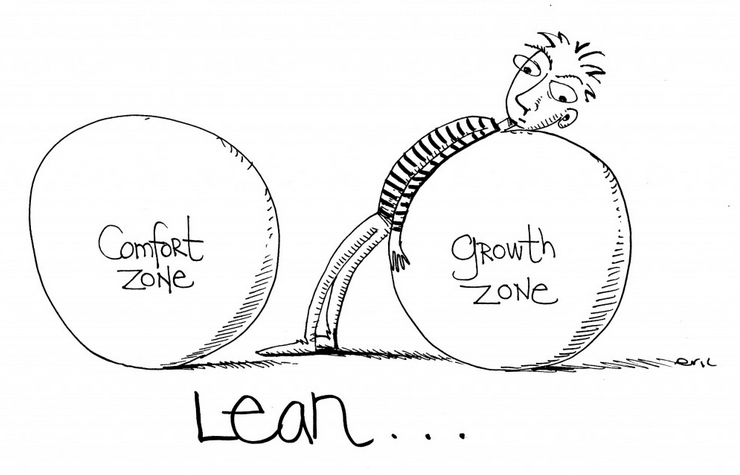
06 Jun Looking to Grow as a Grant Professional? Lean into your Discomfort by Julie Assel, GPC
I am a grant professional for whom the written word is a more comfortable form of communication than face-to-face communication. Once I understood the concepts and intent of grant proposal writing, I fell in love with it. The majority of my time is spent alone in my office writing or in one-on-one conversations with program, financial, and executive leadership staff. Given that my learning style is also visual text, reading RFPs, gathering the information needed, and conducting the research is all easy for me to understand.
Recently though, I have needed to be involved in meetings with program officers. These are not my favorite activity. Oh, I love hearing all the things funders have to say about their organization that help me better understand their mission. I also love to hear all the things about the program that my organizations say to the funder that I have not heard before in quite the same way. (Haven’t we all been here?) If my only task was to listen, these meetings would be easy, but these were conversations in which I was the lead for a significant portion of the conversation.
The first was a difficult conversation about a budget revision with two federal program officers. The second was a conversation with a funder I knew exceptionally well and a client who was having their first meeting with the funder. Even with my experience with federal grants in the first meeting and my deep relationship with this particular program officer in the second, these were not easy conversations for me to lead. I think the same is true for many grant professionals. We tell our staff and clients they should talk with program officers before we apply for a grant, but I would rather write the proposals than talk to the program officers. Being in the lead during these meetings has been uncomfortable, but I think this is actually an opportunity to help others grow when they do portions of their job that might be currently uncomfortable. So here I am using the written word to provide strategies to those who find themselves in these uncomfortable situations.
- Don’t avoid meetings with funders about your organization or program ideas. Just because these meetings are not your strength does not mean you should never do them. If people always avoided the areas they didn’t know or made them uncomfortable, we would not fully exercise our capacity to learn. Lean into them and you may find that they become less stressful over time. Ultimately, you may find that being uncomfortable for a while makes you a stronger grant professional overall.
- Be overprepared. Try to think through all possible directions the conversation might go, and have many resources at your fingertips. What questions do you know they will ask? That said, if they ask and you don’t know, just let them know you will get back with them about that answer (and then make sure you follow through, of course!)
- Wear clothes in which you feel your most professional and your most comfortable. This may mean a color or shirt you know looks good on you, but perhaps not your 4” heels or dress shoes that are a little too tight.
- Be yourself in the relationship. You are not your boss, so don’t try to be. Be authentic in all of your relationships, bring your personality, use your own words and phrases to describe things, bring your sense of humor. Your friendly demeanor will put others at ease and the relationship can grow from there.
- Remind yourself of the importance of the activity to the people you serve. For example, I found myself thinking about the children that ultimately these grants benefit. I have the opportunity to serve these children joyfully every day through my writing. An hour or two of discomfort is a more-than-fair trade when I think about all the challenges they regularly overcome.
While writing about my uncomfortable situation is also not comfortable for me because I am also an introvert (that is for another blog), I hope that my leaning into my discomfort will help other grant professionals further their own personal and professional growth. (See how I did #5 there?!) ????
Competency #7: Knowledge of practices and services that raise the level of professionalism of grant professionals.
Skill 7.3: Identify strategies that grant developers use in building social capital to benefit their communities and society at large.
Competency #8: Knowledge of methods and strategies that cultivate and maintain relationships between fund-seeking and recipient organizations and funders.
Skill 8.3: Identify methods of relationship cultivation, communication, recognition, and stewardship that might appeal to specific funders.
